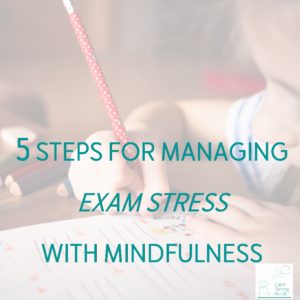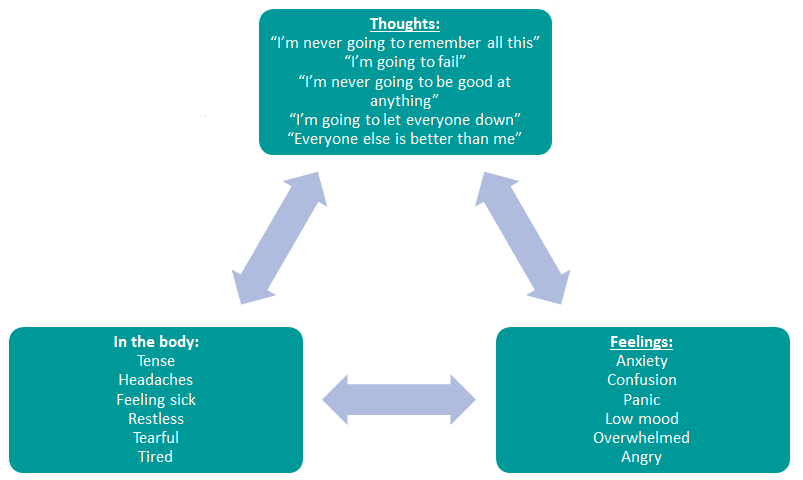Exam Stress
It’s that time of year again when children are put through their paces with exams, whether SATS, GCSE’s, A-levels, IB, End of year exams, music exams, etc etc, it can be a stressful and difficult time for them and their families. Here are some easy to introduce mindfulness activities that you can do at home to help children (and you) cope with the stressors of the next few weeks.

‘Exam Stress’ is often characterised by anxious thought patterns that takes the thinker off to the worst possible outcome… “I’m going to fail, I’ll never get to [the next step], that will mean I won’t be able to do what I want to do, I’ll never be able to  do anything, ‘I am a failure'”. These thought spirals can easily take people into a difficult head-space which can also trigger feelings of low mood. One of the difficulties with exam stress is that when these negative thoughts start to take hold, it becomes more difficult to concentrate, process information or feel motivated. All the things that you want to be able to do when sitting down to revise or even once you are in the exam hall. Feeling muddled in the mind can then reinforces the thoughts such as “I’ll never remember all this” and suddenly you’re in a place of anxiety and possibly panic.
do anything, ‘I am a failure'”. These thought spirals can easily take people into a difficult head-space which can also trigger feelings of low mood. One of the difficulties with exam stress is that when these negative thoughts start to take hold, it becomes more difficult to concentrate, process information or feel motivated. All the things that you want to be able to do when sitting down to revise or even once you are in the exam hall. Feeling muddled in the mind can then reinforces the thoughts such as “I’ll never remember all this” and suddenly you’re in a place of anxiety and possibly panic.
As the cycle continues, it can lead to people behaving in a way they might not want to such as avoiding revision or becoming very emotional. By this point, the calm, rational thinking part of the brain (the pre-frontal cortex) is no longer making the decisions and helping us to problem solve, and the reactive, protective part of the brain (the amygdala) takes over.
Research carried out at Cambridge University has shown that practising mindfulness during exam periods helps to decrease distress and even improve emotional well-being when compared to others not practising mindfulness but going through the same thing.
So, here are 5 easy mindfulness exercises that you can introduce at home.
1. A Simple Breathing Exercise
Regular meditations using breathing exercises are a core of mindfulness practice. I love this easy-to-use exercise that is particularly good during times of panic as you can either focus on the breath or the sensation of the fingers pressing together. It is also a really  great exercise to use in the exam room for example when you are waiting for the instruction to start, or even as a way to maintain calm throughout the exam.
great exercise to use in the exam room for example when you are waiting for the instruction to start, or even as a way to maintain calm throughout the exam.
Simply touch your index finder and thumb together. As you breath in, press them together and as you breath out release them again. Repeat this 5 times for a quick reset, or use throughout a longer meditation if you are finding it hard to focus on the breath.
2. A Mindful Stretch
All that bending over a desk and writing with a pen (rather than typing!) can increase the tension in the muscles in the neck, shoulders, and back. If this builds up, it can easily cause headaches which makes it even harder to concentrate and focus. It is so important to take regular breaks when you are revising and stand up and move around. Here is a simple stretching exercise that you can do to relieve some of that pressure.
Standing up with your feet hips width apart put your hands in a prayer position at chest height. As you breathe in, slowly raise your hands above your head to reach up above you and then breathe out and circle your arms down to your sides. Repeat 3 times. Then reach both hands behind you and hold your left wrist with your right hand. Use your right hand to gently pull your left arm down and away from your body. Hold for 30 seconds before changing sides. As you hold the stretch, take your focus of attention to any points of tension or tightness and continue to breath slowly and calmly.
3. Use Affirmations
Using affirmations regularly is a great way to increase self-esteem and self-confidence. The key to using them effectively is repetition and saying them out loud on a daily basis. A fun way to introduce affirmations to children and teens is to get them to draw around their hand and write an affirmation on each finger. They might be statements like:
‘I am blessed’ | ‘I am amazing’ | ‘I am calm’ | ‘I am loved’ | ‘I am happy’ | ‘I am confident’
Then put the picture somewhere it will be seen everyday.
4. Visualise the Worries Drifting Away
Sometimes there are just too many thoughts that cloud the mind and a breathing exercise is not quite enough to calm everything down. In these situations it can be helpful to find a way to ‘say goodbye’ to the thoughts that are stuck. This is a helpful visualisation exercise that you can use to help this happen:
 Imagine that you are blowing bubbles. In each bubble that rises into the air, put a thought or feeling into it that you no longer want inside you. See the first bubble rise up. Think about what is inside. See the thought, watch it, and see it slowly float away. Try not to judge or think about it more deeply. Once it has floated out of sight, watch the next bubble appear. Think about what is inside. Watch it, and see it slowly float away. If your mind goes blank, then watch the bubble rise up with “blank” inside and slowly float away.
Imagine that you are blowing bubbles. In each bubble that rises into the air, put a thought or feeling into it that you no longer want inside you. See the first bubble rise up. Think about what is inside. See the thought, watch it, and see it slowly float away. Try not to judge or think about it more deeply. Once it has floated out of sight, watch the next bubble appear. Think about what is inside. Watch it, and see it slowly float away. If your mind goes blank, then watch the bubble rise up with “blank” inside and slowly float away.
5. Taking Time Out
Time out from thinking or talking about exams is essential. Think of the brain as like a muscle that needs times of rest as well as times of training. Just think, you wouldn’t train for a marathon by running everyday for as long as you can – you’d be exhausted! Well, the brain is the same, it needs downtime not only to rest but also to process all the information that you have given it and make sure it is filed correctly within the memory banks.
Why not try an activity like mindful colouring as this focus on a completely different activity helps to stop us getting caught up in thoughts about exams again. There are lots of printable images online and some great (and affordable) books suitable for all ages.
Next Steps
I hope that these exercises are helpful to you and provide a space of calm in amongst all the stress and worry that there is bound to be about. If you are looking for more help or ideas then why not come to my workshop dedicated to managing stress in the exam periods. Find out more, or book a place by clicking here.